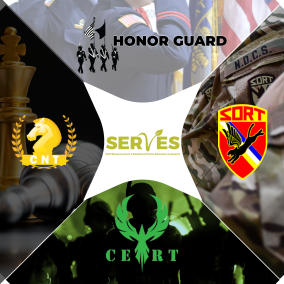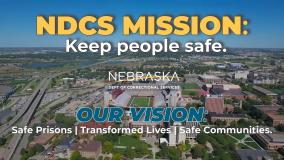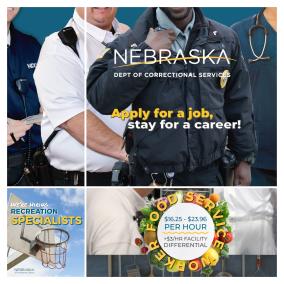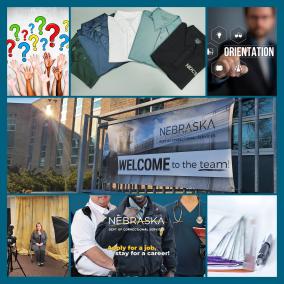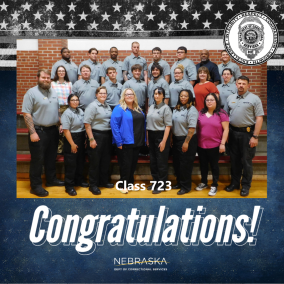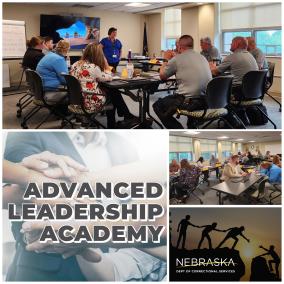|
Anger Management High Risk/Need |
Anger Management High Risk/Need: This treatment provides instruction and practice on basic anger control strategies in a group facilitated by clinicians.
Needs Addressed: Attitudes; behavior; aggression, mental health
|
Clinical Treatment |
|
Continuing Care-Sex Offender Program |
This program helps participants maintain and strengthen the gains they made in other treatment programs. It also helps participants navigate new challenges and helps support the transition back to a community setting.
Needs Addressed: Sex Offender conviction
|
Clinical Treatment |
|
Coping with Anxiety |
Provides treatment on implementing coping strategies and managing symptoms of anxiety while increasing the individual's ability to function despite those issues.
Need Addressed: Mental Health
|
Clinical Treatment |
|
Dialectic Behavior Therapy (DBT) |
Cognitive-Behavioral Treatment that helps participants develop mindfulness-based coping skills to decrease suicidal and self-harming behaviors.
Needs Addressed: Mental Health
|
Clinical Treatment |
|
iHeLP- Inpatient Sex Offender Treatment Program |
The Intpatient Healthy Lives Program (iHeLP) is an inpatient program available to individuals who have been assessed as a high risk for further sexual violence.
Need assessed: High Risk Sex Offender
|
Clinical Treatment |
|
Mental Health Outpatient Services |
Provides general, individual therapy.
Need addressed: Mental Health.
|
Clinical Treatment |
|
oHeLP Outpatient Sex Offender Program |
The Outpatient Healthy Lives Program is available to individuals who are assessed to be at a relatively moderate risk to sexually re-offend.
Need Addressed: Sex Offender
|
Clinical Treatment |
|
7 Habits on the Inside |
Developed by FranklinCovey in cooperation with the Colorado Department of Corrections, 7 Habits on the Inside uses the principles of the 7 Habits of Highly Effective People, tailored for the incarcerated individual. The program seeks to empower individuals to manage their own lives in such a way as to be successful in prison and in the community and using the principles of integrity, proactivity, and other key skills. (12 weeks)
Needs Addressed: Attitudes/Behavior; Family; Employment; Life Skills
|
Non-Clinical Programs |
|
ACTV-NE |
A domestic violence program focused on developing new thinking in the development of relationships.
|
Non-Clinical Programs |
|
Common Sense Parenting |
Provides parents with a menu of techniques that will aid them in building positive family relationships; preventing and correcting misbehavior; using consequences to improve behavior. Teaches self-control and how to stay calm.
Need addressed: Family
|
Non-Clinical Programs |
|
Destination Dads-Inside Out Dads |
Incarcerated fathers get tools they need to become more involved, responsible, and committed in the lives of their children.
Need addressed: Family
|
Non-Clinical Programs |
|
Destination Dads-Within My Reach |
Critical and concrete tools are provided which help participants improve interactions with those who matter in their lives. Subjects are knowing yourself first, smart love and making your own decisions.
Need addressed: Family
|
Non-Clinical Programs |
|
Hustle 2.0 |
A trauma informed mail based correspondence program which explores entrepreneurship, healthy relationships, leadership, criminal thinking, employment, purposeful living, reentry, anger management, character development, victim awareness, persevering, and becoming the solution.
Needs addressed: Attitudes/behavior
|
Non-Clinical Programs |
|
Moral Reconation Therapy (MRT) |
MRT is an evidence-based, cognitive behavioral intervention which leads to enhanced moral reasoning, better decision making and more appropriate behavior.
Needs addressed: Attitudes, behavior.
|
Non-Clinical Programs |
|
Prison Fellowship Academy |
This 12-month program operates in a mission-specific housing unit and focuses on cognitive restructuring with faith-based content.
Needs addressed; Attitudes, behavior
|
Non-Clinical Programs |
|
Restorative Justice Intervention Program |
This program increases a participant's understanding of the harm/damages they caused their victims, communities and themselves. The program also provides an important life skill module that teaches how to become emotionally proficient, which translates into better decision making and reduced conflicts.
Needs Addressed: Attitudes; behavior, Life skills.
|
Non-Clinical Programs |
|
Thinking for a Change |
Thinking for a Change is a high-level cognitive behavioral program developed by the National Institute of Corrections. The program uses role playing to concentrate on changing the criminogenic thinking of offenders.
Needs addressed: Attitudes; behavior; family; friends; aggression.
|
Non-Clinical Programs |
|
Adult Basic Education |
Builds basic skills for GED testing, college readiness and/or skill development.
Need Addressed: Education
|
Education Programs |
|
Adult Secondary Education (ASE) |
Assists students prepare for taking the high school equivalency test (GED).
Addresses Need Area: Education
|
Education Programs |
|
College correspondence |
Opportunity to pursue college coursework through individual and family support.
Need addressed: Education, employment.
|
Education Programs |
|
College Courses |
College courses are offered through various universities/colleges and correspondence courses. Currently, college classes are provided by grant funded providers and/or at the individual's own expense.
Needs Addressed: Education; employment; life skills; pro-social.
|
Education Programs |
|
ESL/ELL |
English as a second language (ESL) provides individuals with literacy support before Adult Basic Education
Needs addressed: Education; life skills
|
Education Programs |
|
High School Diploma |
NDCS operates its own school district with a high school. Students of all ages may attend high school classes. Individuals under 22 who have not graduated from high school are required to be in school. Students over 22 need to go through an application process.
Need addressed: Education.
|
Education Programs |
|
Metro Community College (MCC) Core Courses (Credit) |
Completion of any 3 college credit courses.
Need addressed: Education/Employment/outside interest
|
Education Programs |
|
University of Nebraska Omaha (credit courses) |
Higher level of education in a variety of areas.
Need area addressed: Education, employment, outside interest
|
Education Programs |
|
AA (Alcoholics Anonymous) |
AA (Alcoholics Anonymous) is an organization which encourages members to read, and listen at meetings using the program as an opportunity to face the truth and become accountable for their addiction to alcohol.
Need Addressed: Support for addiction and prosocial activity
|
Pro-Social Activities |
|
Harambee African Cultural Organization (HACO) |
This self-betterment club provides an opportunity to explore the root of the African American culture and heritage, including the past, present and future.
Need addressed: Outside interest, pro-social activity
|
Pro-Social Activities |
|
Intentional Peer Support |
This program allows individuals with similar life experiences to walk along side each other in supportive relationships.
Needs addressed: Attitudes/Behavior; Prosocial Activities
|
Pro-Social Activities |
|
K-9 Foster Care Program |
A program that partners with the Humane Society to care and provide routine training for dogs who will be adopted.
Need Addressed: Pro-Social Activity
|
Pro-Social Activities |
|
MATA Club (Mexican Awareness Through Association) |
Participants in this club learn about the religious, cultural aspects, arts, customs, crafts, language, and the heritage of the Hispanic people.
Needs addressed: Outside interest and support.
|
Pro-Social Activities |
|
Narcotics Anonymous |
Narcotics Anonymous encourages its members to attend meetings, read and listen to speakers to face the truth and be accountable for their addictions.
Need addressed: Drug addiction support; pro-social/outside interest.
|
Pro-Social Activities |
|
Native Americans Spiritual and Cultural Awareness Group (NASCA) |
NASCA is designed to help Native Americans express their uniqueness of cultural and spiritual practices. Participants are given the chance to learn how to sing, pray and dance from a Native perspective.
Needs address: Pro-social/outside interest and support.
|
Pro-Social Activities |
|
Religious Classses and activities |
Variety of classes, workshops and religious services designed to help inmates with support and spiritual development.
Needs addressed: Pro-social, support.
|
Pro-Social Activities |
|
Sports/Recreation Activities |
A variety of activities that encourage health pastimes are offered at all facilities. Please check with recreational specialists for more information.
Needs addressed: Pro-social/outside interest; health.
|
Pro-Social Activities |
|
Veteran's Club |
The Veteran's Group aims to assist all veterans and honorary members, including veterans of the United States of America and its Allies Forces in addition to their dependents and the widows and orphans of deceased veterans. The group provides opportunities for veterans to find employment upon release.
Need Addressed: Employment
|
Pro-Social Activities |
|
Assistance for Social Security Application |
Social workers provide assistance in obtaining and completing Social Security applications to individuals who qualify and are 90 days from discharge, post-release supervision or parole.
Need addressed: Re-entry for those who may qualify for Social Security benefits due to age or disability.
|
Reentry Services |
|
Discharge Planning |
Reentry specialists work with individuals to ensure a reentry plan is completed. The plan allows for a smooth transition to the community and focuses on housing, transportation, employment, education, and medical/mental health services as needed.
Need addressed: Re-entry
|
Reentry Services |
|
Reconnect KEYS (Keep Educating Yourself For Reentry Success |
The program is designed to build confidence and accountability, resiliency, problem solving skills for reentry success and personal growth.
Need area addressed: employment, reentry
|
Reentry Services |
|
Reentry planning |
Clients develop comprehensive reentry plans that include housing/transitional living, employment/education, transportation, ID credentials, medical/mental and behavioral health treatment.
Need addressed: Reentry.
|
Reentry Services |
|
Sex Offender Registration Act (SORA) |
Designed to increase knowledge of sex offender registration laws, how to avoid registration violations and prepare for release with registration laws in mind.
Need addressed: reentry
|
Reentry Services |
|
Clinical Treatment Programs |
See clinical programs list for more details.
|
|
|
Crisis Intervention |
Provided on an as-needed basis, clinicians are available to assist individuals in a mental health crisis.
Needs Addressed: Mental health.
|
|
|
Individual/Group Psychotherapy |
Licensed, clinical therapists provide one-on-one or group therapy sessions as needed.
Need addressed: mental health
|
|
|
Risk Assessment/ Psychological Evaluations |
Risk Assessments and Psychological Evaluations provide diagnosis clarification, intelligence testing and Dementia screening.
Need addressed: Mental Health; education.
|
|
|
Skilled Nursing Facility |
On-call Skilled Nursing Facilities manage crises dealing with medical emergencies, behavioral issues and suicide watches.
Needs addressed: Health and mental health.
|
|
|
Transition Services |
Transition Services are available to those transitioning to or from general population or protective management. Mental Health professionals may assists with these services.
Need Addressed: Mental Health
|
|
|
Community Coordination |
Social workers coordinate with a variety of community providers and agencies for mental health services, substance abuse treatment and medical services. Providers include the Veteran's Administration, DHHS, treatment agencies, private practice and non-profit organizations.
Needs Addressed: Housing, medical, mental health, basic needs, re-entry.
|
Social Work Services |
|
Living Needs |
Social workers assist individuals with high medical/mental health needs to find clothing resources, apply for benefits or general assistance and other life needs.
Needs addressed: Social work services.
|
Social Work Services |
|
Medical Services Coordination |
Social workers assist individuals with high medical needs to set appointments for medication management, healthcare and provide resources to obtain medical insurance upon release:
Needs addressed: Health, mental health, life skills, re-entry.
|
Social Work Services |
|
Specialized Housing Services |
Social workers provide assistance to individuals with high medical/mental health needs to obtain transitional living, assisted living or skilled nursing care, as needed.
Needs addressed: Re-entry
|
Social Work Services |
|
Specialized Population Served |
Specialized Population Served offers services for inmates with mental illness or serious chronic medical conditions that are high risk and multi-needs.
Needs addressed: Health; mental health
|
Social Work Services |
|
Alpha |
Alpha promotes daily living skills and encourages character development. All classes are biblically based and open to anyone, regardless of religious affiliation. The program includes lessons on addiction prevention, understanding marriage, understanding parenthood and managing finances.
Needs Addressed: Attitudes; behavior; life skills, family
|
Vocational/Life Skills Programs |
|
Cabinet Maker Apprentice |
Apprenticeship for learning carpentry skills.
Need addressed: Employment
|
Vocational/Life Skills Programs |
|
Career Readiness |
Helps individuals identify a specific career path; learn professional and personal skills to assist them in getting a job.
Need addressed: Employment
|
Vocational/Life Skills Programs |
|
Community Alliance Charting a New Course |
Education on intervention, diversion, and aftercare including stages of change.
_______________________________________________________________________________________________________________________________________
Addresses: substance use
|
Vocational/Life Skills Programs |
|
Community Alliance Financial Literacy |
Education on creting and sticking to a budget, managing credit and building savings.
______________________________________________________________________________________________________________________________
Addressed Need: Life skills
|
Vocational/Life Skills Programs |
|
Community Alliance Seeking Safety |
Educates about the consequences of trauma and the links between trauma and substance use.
_______________________________________________________________________________________________________________________________________
Need addressed: substance use
|
Vocational/Life Skills Programs |
|
Computer based Education and Training |
Certificate program utilizing tablets for improvement in academics and job training.
Need addressed: Education. employment
|
Vocational/Life Skills Programs |
|
Department of Labor Workforce Development |
Helps participants develop a resume, prepare for interviews and work on job skills.
Need area addressed: Employment
|
Vocational/Life Skills Programs |
|
Forklift Certification-CSI |
Training in how to use and operate a forklift.
Need addressed: Employment
|
Vocational/Life Skills Programs |
|
Furniture Finisher Apprenticeship |
Instruction and training in shaping, finishing, and refinishing damaged, warn or used furniture or new high grade furniture to specification.
Need Addressed: Employment
|
Vocational/Life Skills Programs |
|
Goals , Plans, and Strategies for Reentry and Life Success (GPS) |
Two learning modules to develop reentry and life skills
Addresses: life skills
|
Vocational/Life Skills Programs |
|
Health Course |
This program, delivered by a wellness expert, provides workshops on preventative health education and nutrition, such as Men's Birth Control; Date Abuse; Bullying; Gender Boxes; and Hygiene.
Need addressed: Health.
|
Vocational/Life Skills Programs |
|
Materials Coordinator Apprenticeship |
Instruction and training in material handling including shipping and receiving.
Need addressed: Employment
|
Vocational/Life Skills Programs |
|
Mental Health Association Wellness and Recovery Action Plan (WRAP) |
Discusses deescalation; decision making and consequences; how trauma impacts; and how to overcome negative ways of dealing with stressful situations and crises. Need addressed: Life skills.
|
Vocational/Life Skills Programs |
|
Metro Community College (MCC) CDL Preparation |
Teaches CDL safety fundamentals, develops awareness of essential regulatory requirements and responsibilities not related directly to driving, explores practical CDL application of information to hands on training with a truck trainer simulator.
Need addressed: Employment
|
Vocational/Life Skills Programs |
|
Metro Community College (MCC) Orientation/Initial Communication |
Teaches and discusses career planning, program determination, scholarship information, registering for classes/training, financial aid/funding information, conducting assessments, creation of educational plans, and assists students with community resources referrals.
Needs addressed: Education, employment
|
Vocational/Life Skills Programs |
|
Metro Community College (MCC) OSHA 10 or 30 Hour |
Comprehensive training in mandated job safety requirements and guidelines.
Need addressed: Employment
|
Vocational/Life Skills Programs |
|
Metro Community College (MCC) Welding Preparation |
Teaches basic welding courses for entry level welding employment.
Need addressed: Employment
|
Vocational/Life Skills Programs |
|
Metro Community College (MCC)-ACT National Career Readiness |
Measures/certifies skills needed for job success. Used by employers, educators and others to provide evidence that job seekers have the skills employers are looking for.
Need addressed: Vocational Life skills
|
Vocational/Life Skills Programs |
|
RISE |
This program targets entrepreneurial-minded individuals and offers intensive leadership development, business plan competitions, executive mentoring, financial investment, and startup incubation.
Needs addressed: Life skills; employment, reentry
|
Vocational/Life Skills Programs |
|
RISE Continuing Education Program |
Continuing education for all RISE graduates.
Need Addressed: Employment and Reentry
|
Vocational/Life Skills Programs |
|
Shop Tailor Apprenticeship |
Instruction and apprenticeship learning in design, creating, altering and repair of garments.
Need addressed: Lifeskills and employment
|
Vocational/Life Skills Programs |
|
Upholstery Apprenticeship |
Trains staff in the skills of doing upholstery work.
Need addressed: Employment
|
Vocational/Life Skills Programs |
|
Yin Yoga |
Learning and practicing meditation through body movements and stretches. All poses are designed to be done on bunks.
Need addressed: Health, outside interest
|
Vocational/Life Skills Programs |


